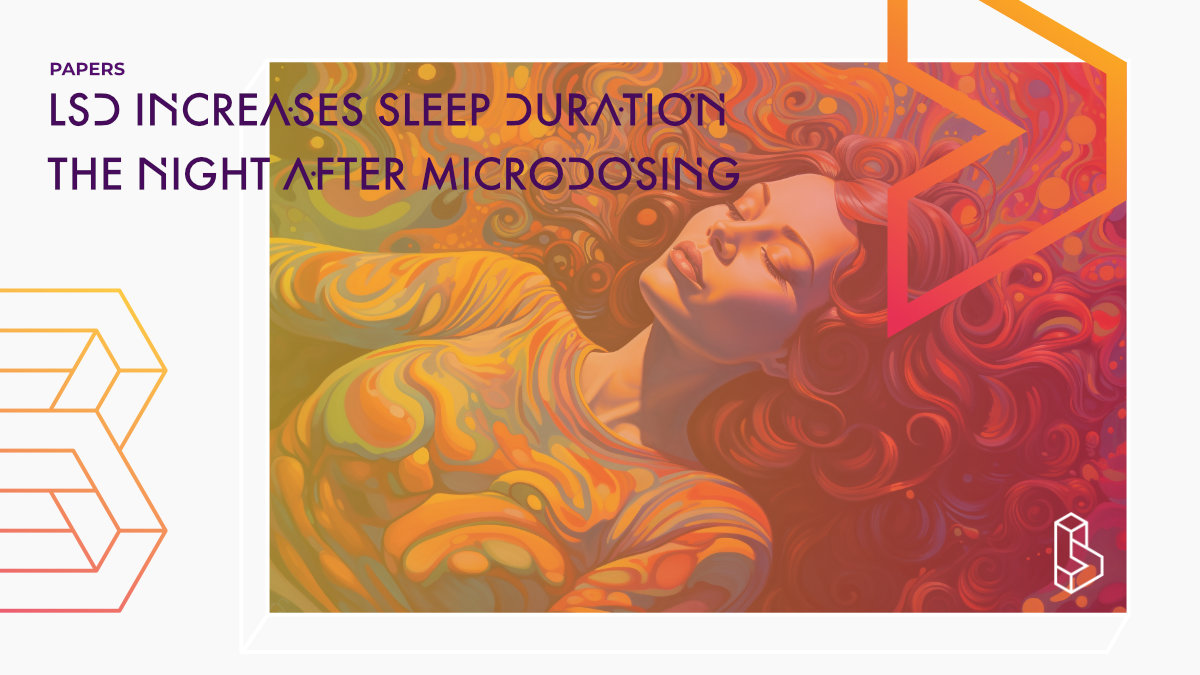This Phase I RCT (n=80) examined the effects of microdosing LSD (10μcg; 14x; 6w) on sleep in healthy adult male volunteers, with doses self-administered every third day and sleep monitored through a commercially available sleep/activity tracker. The results showed that participants in the LSD group slept an extra 24.3 minutes per night on the night after microdosing compared to the placebo group, with no changes in sleep stages or physical activity.
Abstract of LSD increases sleep duration the night after microdosing
“Microdosing psychedelic drugs, at a level below the threshold to induce hallucinations, is an increasingly common lifestyle practise. However, the effects of microdosing on sleep have not been previously reported. Here we report results from a Phase 1 randomised controlled trial in which 80 healthy adult male volunteers received a six week course of either LSD (10 mcg) or placebo with doses self-administered every third day. Participants used a commercially available sleep/activity tracker for the duration of the trial. Data from 3231 nights of sleep showed that on the night after microdosing participants in the LSD group slept an extra 24.3 minutes per night (95% Confidence Interval 10.3 – 38.3 minutes) compared to placebo – with no reductions of sleep observed on the dosing day itself. There were no changes in the proportion of time spent in various sleep stages or in participant physical activity. These results show clear modification of the physiological sleep requirements in healthy volunteers who microdose, and may have implications for the proposed therapeutic effects of microdosing in mood disorders such as major depressive disorder where sleep is frequently disturbed. The clear, clinically significant, changes in objective measurements of sleep observed are difficult to explain as a placebo effect.”
Authors: Nathan Allen, Aron Jeremiah, Robin Murphy, Rachael Sumner, Anna Forsyth, Nicholas Hoeh, David B. Menkes, William Evans, Suresh Muthukumaraswamy, Frederick Sundram & Partha Roop
Summary of LSD increases sleep duration the night after microdosing
Microdosing is a relatively recent practice in which users self-administer psychedelic drugs in repeated doses at levels below the threshold for overtly causing hallucinations. It has been reported to cause distinct changes in neurophysiological function, but no reports of changes in objectively measured behaviours. In a crossover design study, ayahuasca did not subjectively impair sleep quality, but decreased the amount and relative proportion of time spent in REM sleep, increased REM onset latency, and enhanced power of slow-wave NREM sleep. Psilocybin increased REM onset latency with a trend to decrease REM duration.
LSD administered just before or one hour after participants went to sleep increased REM duration and body movements, and arousal periods occurred during some REM sleep periods. However, the timing of drug administration was inconsistent with modern microdosing practices.
Find this paper
LSD increases sleep duration the night after microdosing
https://doi.org/10.1038/s41398-024-02900-4
Open Access | Google Scholar | Backup | 🕊
Cite this paper (APA)
Allen, N., Jeremiah, A., Murphy, R., Sumner, R., Forsyth, A., Hoeh, N., ... & Roop, P. (2024). LSD increases sleep duration the night after microdosing. Translational Psychiatry, 14(1), 191.
Study details
Compounds studied
LSD
Topics studied
Microdosing
Study characteristics
Original Re-analysis
Placebo-Controlled
Double-Blind
Longitudinal
Randomized
Participants
80
Humans
Institutes
Institutes associated with this publication
MindBio TherapeuticsMindBio Therapeutics is conducting clinical research exploring the effects of microdosing psychedelic medicines to treat a range of medical conditions such as depression, anxiety, PTSD, panic disorder, chronic pain and opioid addiction.
Compound Details
The psychedelics given at which dose and how many times
LSD 10 μg | 14xLinked Research Papers
Notable research papers that build on or are influenced by this paper
Pharmacokinetics and pharmacodynamics of sublingual microdosed lysergic acid diethylamide in healthy adult volunteersThis re-analysis of a Phase I RCT (n=80) examines the pharmacokinetics (how the body affects a drug) of LSD microdosing (10µg; 14x; 6w) in healthy adult males. The study established a one-compartment pharmacokinetic model showing an elimination half-life of 3.08h, found minimal physiological effects (<15% change in heart rate), noted possible influence of CYP enzymes on drug metabolism, and reported no changes in peripheral BDNF levels.
Multimodal creativity assessments following acute and sustained microdosing of lysergic acid diethylamide
This re-analysis of an RCT (n=80) finds no effect of LSD microdosing (10µg, x14) on creativity in healthy adult males. Participants received either LSD or placebo every third day for six weeks, with creativity assessed using multiple tests at baseline, during acute dosing, and after the six-week regimen.
Modulation of long-term potentiation following microdoses of LSD captured by thalamo-cortical modelling in a randomised, controlled trial
This randomized controlled trial (n=80) investigated the effects of microdosed LSD (10µg; 14x) on neural plasticity using a visual long-term potentiation (LTP) EEG paradigm. Participants received either LSD or placebo and completed the visual LTP paradigm both acutely and after six weeks of repeated microdosing. While event-related potential (ERP) analyses didn't show changes in visually induced LTP, dynamic causal modelling revealed alterations in laminar connectivity in the primary visual cortex, suggesting a more sensitive approach to assessing neural plasticity compared to traditional peak analysis methods.
Acute mood-elevating properties of microdosed LSD in healthy volunteers: a home-administered randomised controlled trial
This placebo-controlled, randomized, naturalistic study (n=80) of repeated microdoses of LSD (10μg, 14x, 6w) finds improved ratings, on dosing days, on creativity, connectedness, energy, and other wellness ratings. Though these transient changes were found, no enduring changes to mood and cognition were observed.
Linked Clinical Trial
A randomised, double-blind, placebo-controlled trial to study the effects of repeated microdoses of lysergic acid diethylamide (LSD) on creativity and brain activity in healthy adult malesThis randomized, double-blind, placebo-controlled trial (n=80) will study the effects of repeated microdoses of lysergic acid diethylamide (LSD) on creativity and brain activity in healthy adult males. Participants will receive either 10 µg of LSD or a placebo, dissolved in water in 1 ml oral syringes, taken once every three days for a total of 14 doses over a 41-day regimen.

